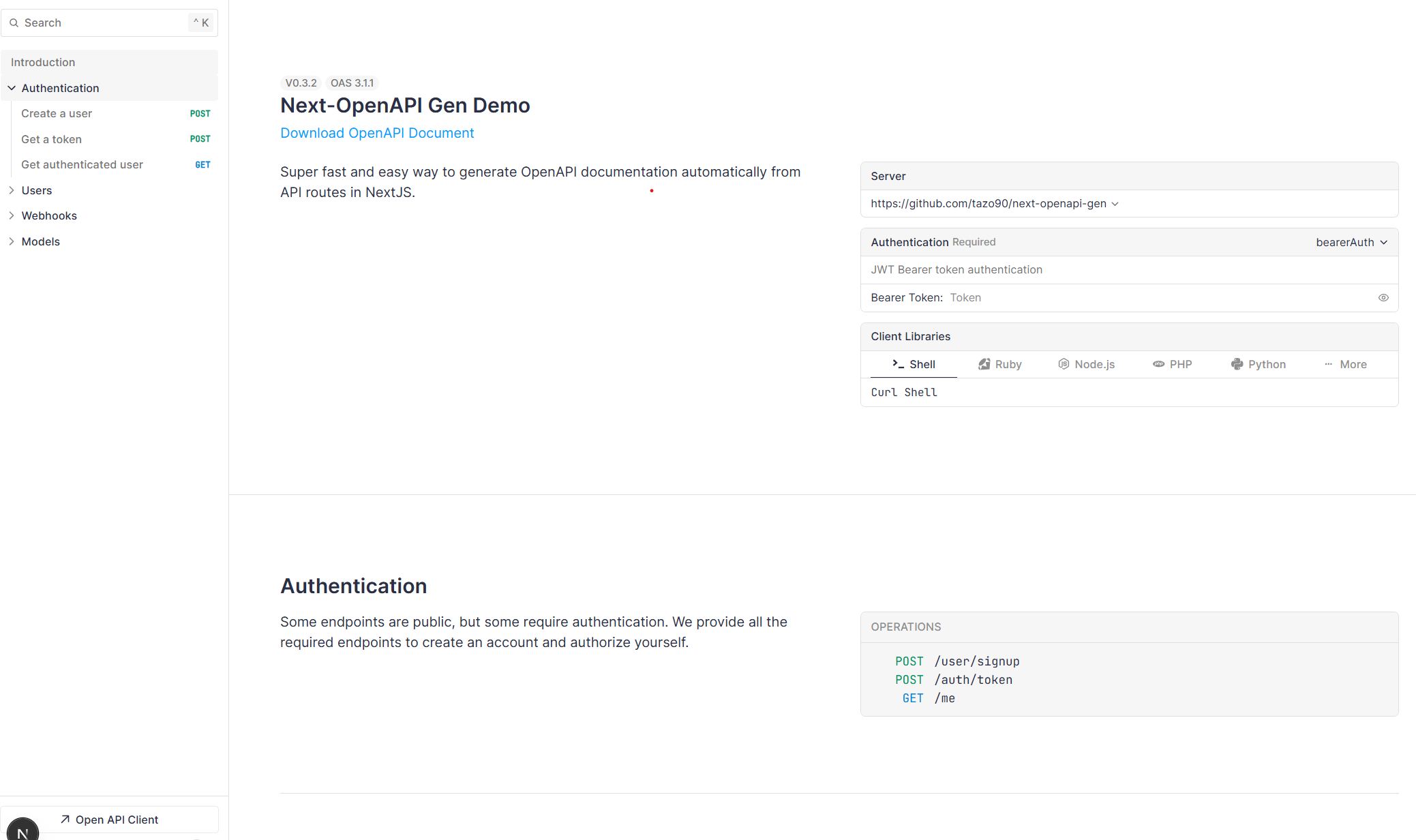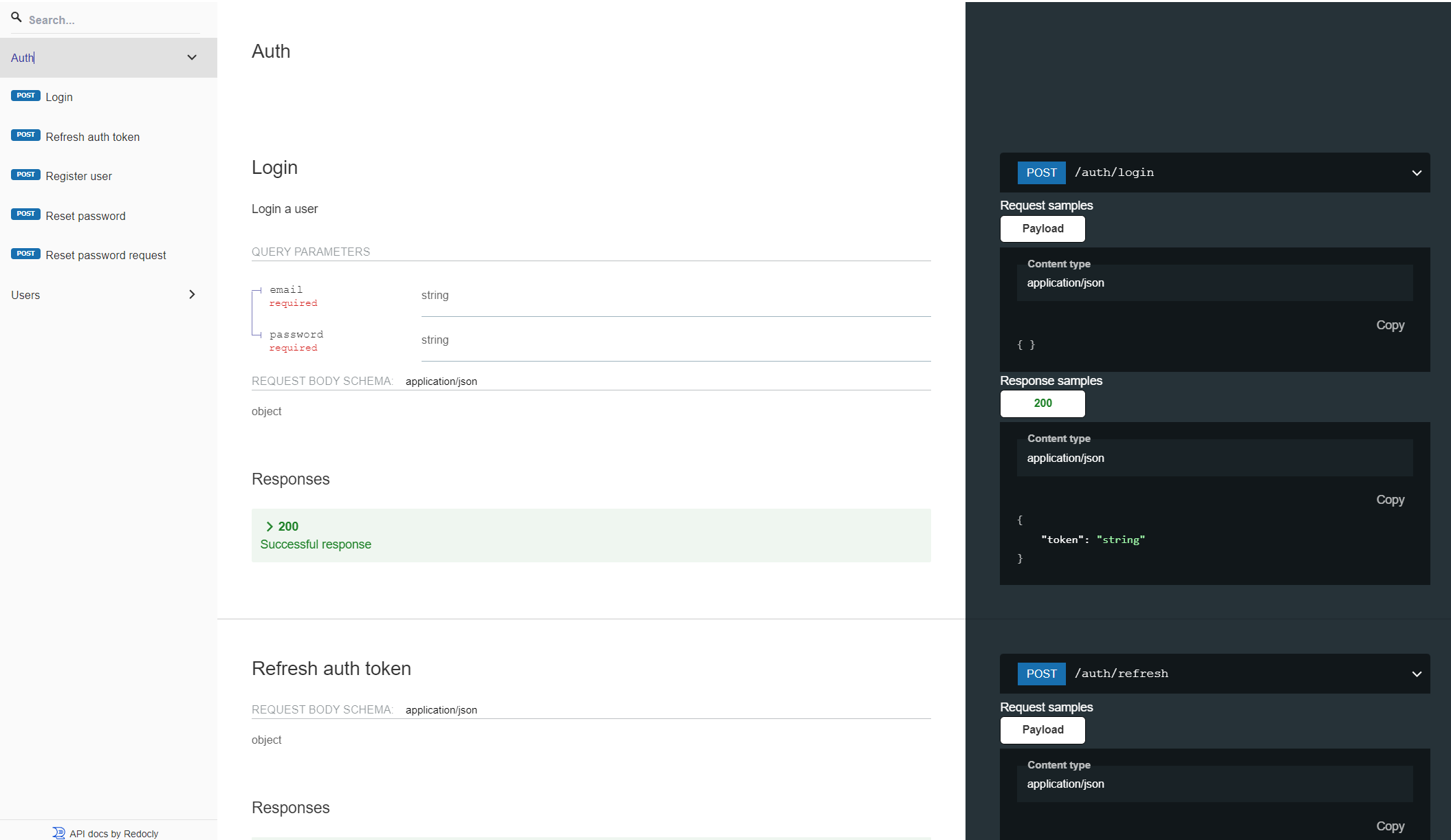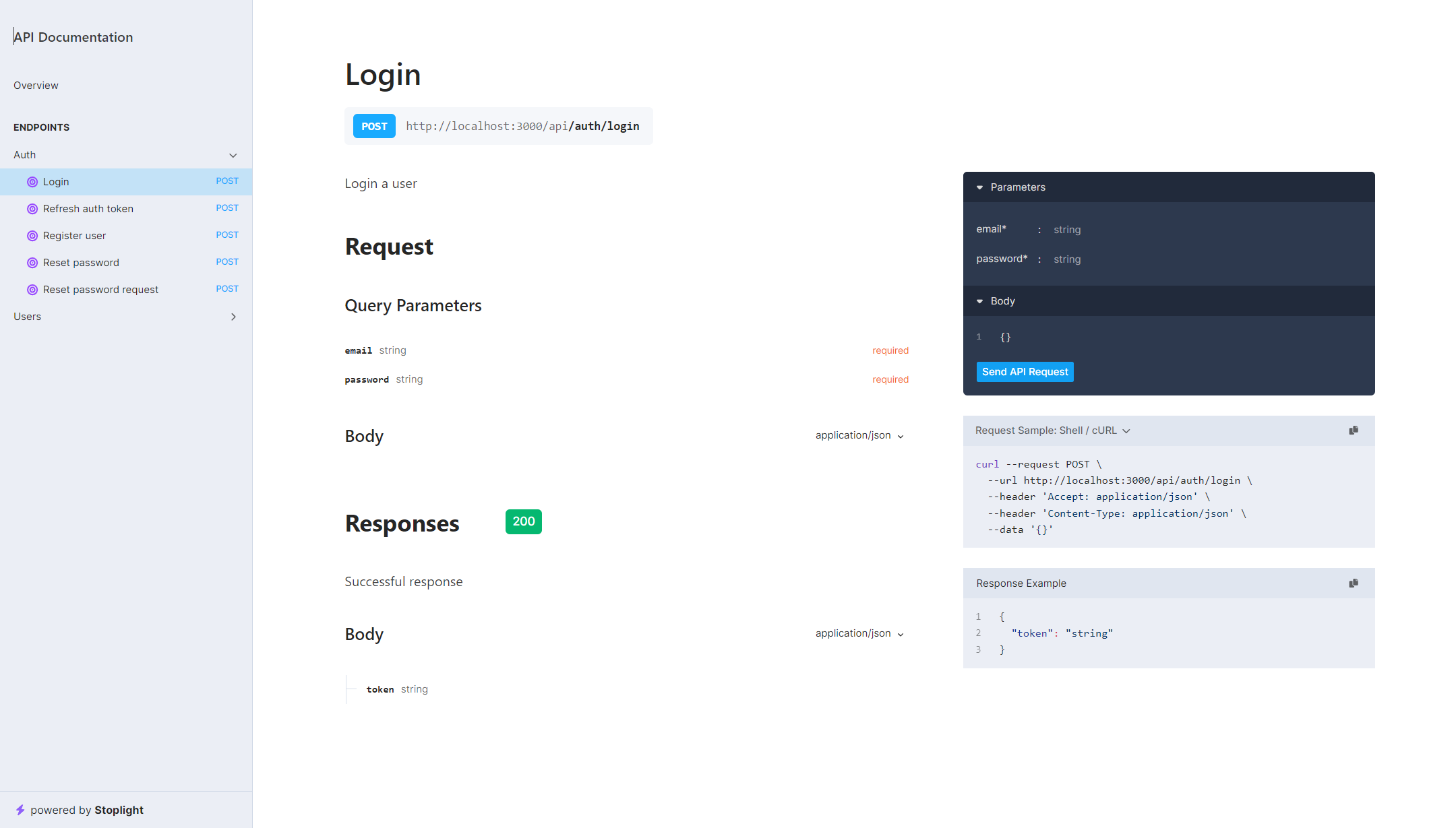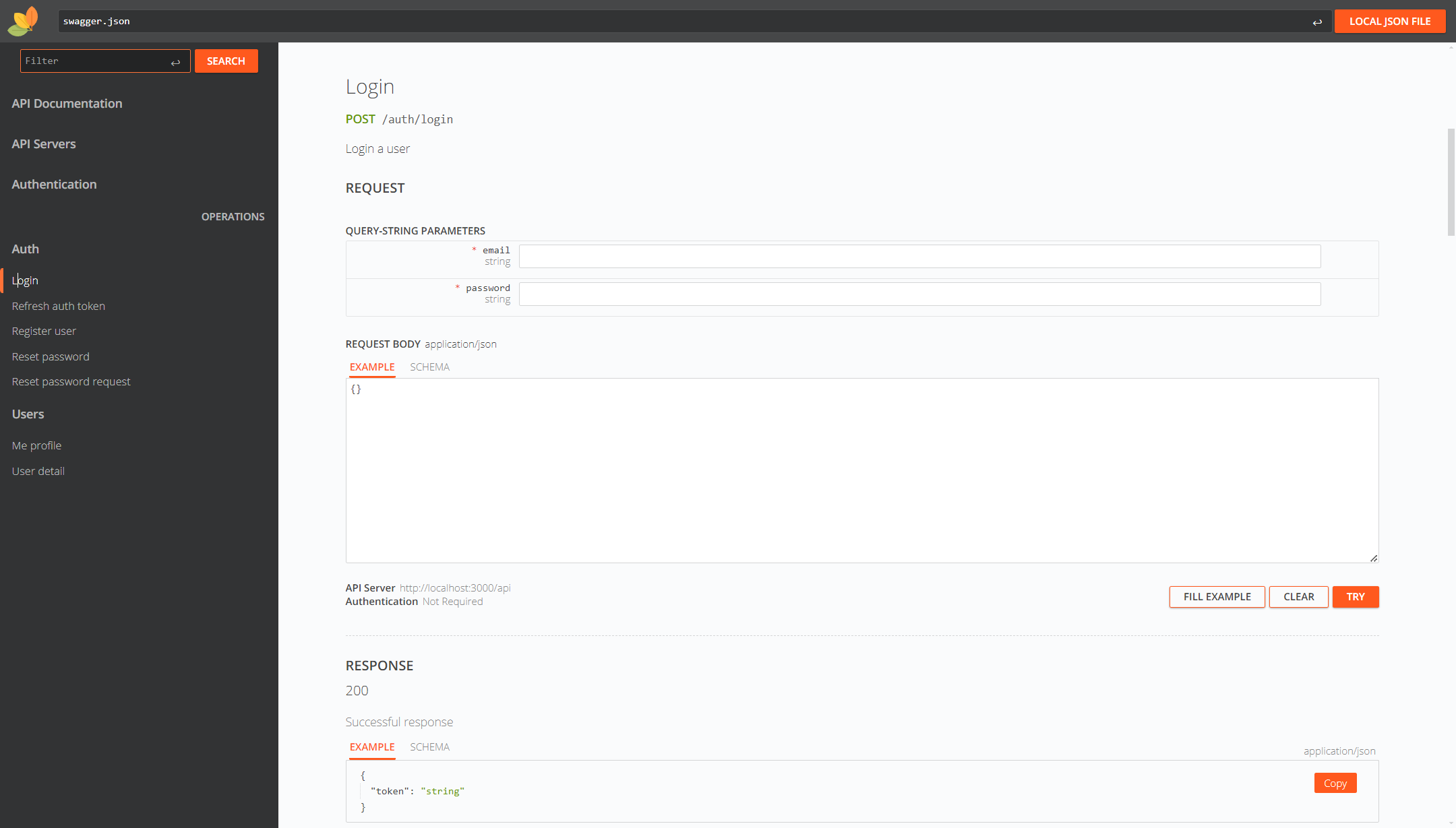Package Exports
- next-openapi-gen
- next-openapi-gen/dist/index.js
This package does not declare an exports field, so the exports above have been automatically detected and optimized by JSPM instead. If any package subpath is missing, it is recommended to post an issue to the original package (next-openapi-gen) to support the "exports" field. If that is not possible, create a JSPM override to customize the exports field for this package.
Readme
next-openapi-gen
Automatically generate OpenAPI 3.0 documentation from Next.js projects, with support for Zod schemas and TypeScript types.
Features
- ✅ Automatic OpenAPI 3.0 documentation generation from Next.js App Router
- ✅ Multiple schema types:
TypeScript,Zod,Drizzle-Zod, orcustom YAML/JSONfiles 🆕 - ✅ Mix schema sources simultaneously - perfect for gradual migrations 🆕
- ✅ JSDoc comments with intelligent parameter examples
- ✅ Multiple UI interfaces:
Scalar,Swagger,Redoc,Stoplight, andRapiDocavailable at/api-docsurl - ✅ Auto-detection of path parameters (e.g.,
/users/[id]/route.ts) - ✅ Intuitive CLI for quick setup and generation
Supported interfaces
- Scalar 🆕
- Swagger
- Redoc
- Stoplight Elements
- RapiDoc
[!TIP] You can use the
--ui noneoption during initialization to skip UI setup if you only care about generating the OpenAPI documentation.
Installation
npm install next-openapi-gen --save-devQuick Start
# Initialize OpenAPI configuration
npx next-openapi-gen init --ui scalar --docs-url api-docs --schema zod
# Generate OpenAPI documentation
npx next-openapi-gen generate[!TIP] Use the
--outputoption in theinitcommand to specify a custom output file for the template. Then you can use the--templateoption in thegeneratecommand to point to that file.
Configuration
During initialization (npx next-openapi-gen init), a configuration file next.openapi.json will be created in the project's root directory:
{
"openapi": "3.0.0",
"info": {
"title": "Next.js API",
"version": "1.0.0",
"description": "API generated by next-openapi-gen"
},
"servers": [
{
"url": "http://localhost:3000",
"description": "Local server"
}
],
"apiDir": "src/app/api",
"schemaDir": "src/types", // or "src/schemas" for Zod schemas
"schemaType": "zod", // or "typescript", or ["zod", "typescript"] for multiple
"schemaFiles": [], // Optional: ["./schemas/models.yaml", "./schemas/api.json"]
"outputFile": "openapi.json",
"outputDir": "./public",
"docsUrl": "/api-docs",
"includeOpenApiRoutes": false,
"ignoreRoutes": [],
"debug": false
}Configuration Options
| Option | Description |
|---|---|
apiDir |
Path to the API directory |
schemaDir |
Path to the types/schemas directory |
schemaType |
Schema type: "zod", "typescript", or ["zod", "typescript"] for multiple |
schemaFiles |
Optional: Array of custom OpenAPI schema files (YAML/JSON) to include |
outputFile |
Name of the OpenAPI output file |
outputDir |
Directory where OpenAPI file will be generated (default: "./public") |
docsUrl |
API documentation URL (for Swagger UI) |
includeOpenApiRoutes |
Whether to include only routes with @openapi tag |
ignoreRoutes |
Array of route patterns to exclude from documentation (supports wildcards) |
defaultResponseSet |
Default error response set for all endpoints |
responseSets |
Named sets of error response codes |
errorConfig |
Error schema configuration |
debug |
Enable detailed logging during generation |
Documenting Your API
With Zod Schemas
// src/app/api/products/[id]/route.ts
import { NextRequest, NextResponse } from "next/server";
import { z } from "zod";
export const ProductParams = z.object({
id: z.string().describe("Product ID"),
});
export const ProductResponse = z.object({
id: z.string().describe("Product ID"),
name: z.string().describe("Product name"),
price: z.number().positive().describe("Product price"),
});
/**
* Get product information
* @description Fetches detailed product information by ID
* @pathParams ProductParams
* @response ProductResponse
* @openapi
*/
export async function GET(
request: NextRequest,
{ params }: { params: { id: string } }
) {
// Implementation...
}With TypeScript Types
// src/app/api/users/[id]/route.ts
import { NextRequest, NextResponse } from "next/server";
type UserParams = {
id: string; // User ID
};
type UserResponse = {
id: string; // User ID
name: string; // Full name
email: string; // Email address
};
/**
* Get user information
* @description Fetches detailed user information by ID
* @pathParams UserParams
* @response UserResponse
* @openapi
*/
export async function GET(
request: NextRequest,
{ params }: { params: { id: string } }
) {
// Implementation...
}With Drizzle-Zod
// src/db/schema.ts - Define your Drizzle table
import { pgTable, serial, varchar, text } from "drizzle-orm/pg-core";
export const posts = pgTable("posts", {
id: serial("id").primaryKey(),
title: varchar("title", { length: 255 }).notNull(),
content: text("content").notNull(),
});
// src/schemas/post.ts - Generate Zod schema with drizzle-zod
import { createInsertSchema, createSelectSchema } from "drizzle-zod";
import { posts } from "@/db/schema";
export const CreatePostSchema = createInsertSchema(posts, {
title: (schema) => schema.title.min(5).max(255).describe("Post title"),
content: (schema) => schema.content.min(10).describe("Post content"),
});
export const PostResponseSchema = createSelectSchema(posts);
// src/app/api/posts/route.ts - Use in your API route
/**
* Create a new post
* @description Create a new blog post with Drizzle-Zod validation
* @body CreatePostSchema
* @response 201:PostResponseSchema
* @openapi
*/
export async function POST(request: NextRequest) {
const body = await request.json();
const validated = CreatePostSchema.parse(body);
// Implementation...
}JSDoc Documentation Tags
| Tag | Description |
|---|---|
@description |
Endpoint description |
@operationId |
Custom operation ID (overrides auto-generated ID) |
@pathParams |
Path parameters type/schema |
@params |
Query parameters type/schema |
@body |
Request body type/schema |
@bodyDescription |
Request body description |
@response |
Response type/schema with optional code and description (User, 201:User, User:Description, 201:User:Description) |
@responseDescription |
Response description |
@responseSet |
Override default response set (public, auth, none) |
@add |
Add custom response codes (409:ConflictResponse, 429) |
@contentType |
Request body content type (application/json, multipart/form-data) |
@auth |
Authorization type (bearer, basic, apikey) |
@tag |
Custom tag |
@deprecated |
Marks the route as deprecated |
@openapi |
Marks the route for inclusion in documentation (if includeOpenApiRoutes is enabled) |
@ignore |
Excludes the route from OpenAPI documentation |
CLI Usage
1. Initialization
npx next-openapi-gen initThis command will generate following elements:
- Generate
next.openapi.jsonconfiguration file - Set up
ScalarUI for documentation display - Add
/api-docspage to display OpenAPI documentation - Configure
zodas the default schema tool
2. Generate Documentation
npx next-openapi-gen generateThis command will generate OpenAPI documentation based on your API code:
- Scan API directories for routes
- Analyze types/schemas
- Generate OpenAPI file (
openapi.json) in specified output directory (default:publicfolder) - Create Scalar/Swagger UI endpoint and page (if enabled)
3. View API Documentation
To see API documenation go to http://localhost:3000/api-docs
Examples
Path Parameters
// src/app/api/users/[id]/route.ts
// Zod
const UserParams = z.object({
id: z.string().describe("User ID"),
});
// Or TypeScript
type UserParams = {
id: string; // User ID
};
/**
* @pathParams UserParams
*/
export async function GET() {
// ...
}Query Parameters
// src/app/api/users/route.ts
// Zod
const UsersQueryParams = z.object({
page: z.number().optional().describe("Page number"),
limit: z.number().optional().describe("Results per page"),
search: z.string().optional().describe("Search phrase"),
});
// Or TypeScript
type UsersQueryParams = {
page?: number; // Page number
limit?: number; // Results per page
search?: string; // Search phrase
};
/**
* @params UsersQueryParams
*/
export async function GET() {
// ...
}Request Body
// src/app/api/users/route.ts
// Zod
const CreateUserBody = z.object({
name: z.string().describe("Full name"),
email: z.string().email().describe("Email address"),
password: z.string().min(8).describe("Password"),
});
// Or TypeScript
type CreateUserBody = {
name: string; // Full name
email: string; // Email address
password: string; // Password
};
/**
* @body CreateUserBody
* @bodyDescription User registration data including email and password
*/
export async function POST() {
// ...
}Response
// src/app/api/users/route.ts
// Zod
const UserResponse = z.object({
id: z.string().describe("User ID"),
name: z.string().describe("Full name"),
email: z.string().email().describe("Email address"),
createdAt: z.date().describe("Creation date"),
});
// Or TypeScript
type UserResponse = {
id: string; // User ID
name: string; // Full name
email: string; // Email address
createdAt: Date; // Creation date
};
/**
* @response UserResponse
* @responseDescription Returns newly created user object
*/
export async function GET() {
// ...
}
// Alternative formats with inline description
/**
* @response UserResponse:Returns user profile data
*/
export async function GET() {
// ...
}
/**
* @response 201:UserResponse:Returns newly created user
*/
export async function POST() {
// ...
}
/**
* @response 204:Empty:User successfully deleted
*/
export async function DELETE() {
// ...
}Authorization
// src/app/api/protected/route.ts
/**
* @auth bearer
*/
export async function GET() {
// ...
}Deprecated
// src/app/api/v1/route.ts
// Zod
const UserSchema = z.object({
id: z.string(),
name: z.string(),
fullName: z.string().optional().describe("@deprecated Use name instead"),
email: z.string().email(),
});
// Or TypeScript
type UserResponse = {
id: string;
name: string;
/** @deprecated Use firstName and lastName instead */
fullName?: string;
email: string;
};
/**
* @body UserSchema
* @response UserResponse
*/
export async function GET() {
// ...
}Custom Operation ID
// src/app/api/users/[id]/route.ts
/**
* Get user by ID
* @operationId getUserById
* @pathParams UserParams
* @response UserResponse
*/
export async function GET() {
// ...
}
// Generates: operationId: "getUserById" instead of auto-generated "get-users-{id}"File Uploads / Multipart Form Data
// src/app/api/upload/route.ts
// Zod
const FileUploadSchema = z.object({
file: z.custom<File>().describe("Image file (PNG/JPG)"),
description: z.string().optional().describe("File description"),
category: z.string().describe("File category"),
});
// Or TypeScript
type FileUploadFormData = {
file: File;
description?: string;
category: string;
};
/**
* @body FileUploadSchema
* @contentType multipart/form-data
*/
export async function POST() {
// ...
}Response Management
Zero Config + Response Sets
Configure reusable error sets in next.openapi.json:
{
"defaultResponseSet": "common",
"responseSets": {
"common": ["400", "401", "500"],
"public": ["400", "500"],
"auth": ["400", "401", "403", "500"]
}
}Usage Examples
/**
* Auto-default responses
* @response UserResponse
* @openapi
*/
export async function GET() {}
// Generates: 200:UserResponse + common errors (400, 401, 500)
/**
* With custom description inline
* @response UserResponse:Complete user profile information
* @openapi
*/
export async function GET() {}
// Generates: 200:UserResponse (with custom description) + common errors
/**
* Override response set
* @response ProductResponse
* @responseSet public
* @openapi
*/
export async function GET() {}
// Generates: 200:ProductResponse + public errors (400, 500)
/**
* Add custom responses with description
* @response 201:UserResponse:User created successfully
* @add 409:ConflictResponse
* @openapi
*/
export async function POST() {}
// Generates: 201:UserResponse (with custom description) + common errors + 409:ConflictResponse
/**
* Combine multiple sets
* @response UserResponse
* @responseSet auth,crud
* @add 429:RateLimitResponse
* @openapi
*/
export async function PUT() {}
// Combines: auth + crud errors + custom 429Error Schema Configuration
Define consistent error schemas using templates:
{
"defaultResponseSet": "common",
"responseSets": {
"common": ["400", "500"],
"auth": ["400", "401", "403", "500"],
"public": ["400", "500"]
},
"errorConfig": {
"template": {
"type": "object",
"properties": {
"error": {
"type": "string",
"example": "{{ERROR_MESSAGE}}"
},
"code": {
"type": "string",
"example": "{{ERROR_CODE}}"
}
}
},
"codes": {
"400": {
"description": "Bad Request",
"variables": {
"ERROR_MESSAGE": "Invalid request parameters",
"ERROR_CODE": "BAD_REQUEST"
}
},
"401": {
"description": "Unauthorized",
"variables": {
"ERROR_MESSAGE": "Authentication required",
"ERROR_CODE": "UNAUTHORIZED"
}
},
"403": {
"description": "Forbidden",
"variables": {
"ERROR_MESSAGE": "Access denied",
"ERROR_CODE": "FORBIDDEN"
}
},
"404": {
"description": "Not Found",
"variables": {
"ERROR_MESSAGE": "Resource not found",
"ERROR_CODE": "NOT_FOUND"
}
},
"500": {
"description": "Internal Server Error",
"variables": {
"ERROR_MESSAGE": "An unexpected error occurred",
"ERROR_CODE": "INTERNAL_ERROR"
}
}
}
}
}Ignoring Routes
You can exclude routes from OpenAPI documentation in two ways:
Using @ignore Tag
Add the @ignore tag to any route you want to exclude:
// src/app/api/internal/route.ts
/**
* Internal route - not for documentation
* @ignore
*/
export async function GET() {
// This route will not appear in OpenAPI documentation
}Using ignoreRoutes Configuration
Add patterns to your next.openapi.json configuration file to exclude multiple routes at once:
{
"openapi": "3.0.0",
"info": {
"title": "Next.js API",
"version": "1.0.0"
},
"apiDir": "src/app/api",
"ignoreRoutes": ["/internal/*", "/debug", "/admin/test/*"]
}Pattern matching supports wildcards:
/internal/*- Ignores all routes under/internal//debug- Ignores only the/debugroute/admin/*/temp- Ignores routes like/admin/users/temp,/admin/posts/temp
Advanced Usage
Automatic Path Parameter Detection
The library automatically detects path parameters and generates documentation for them:
// src/app/api/users/[id]/posts/[postId]/route.ts
// Will automatically detect 'id' and 'postId' parameters
export async function GET() {
// ...
}If no type/schema is provided for path parameters, a default schema will be generated.
TypeScript Generics Support
The library supports TypeScript generic types and automatically resolves them during documentation generation:
// src/app/api/llms/route.ts
import { NextResponse } from "next/server";
// Define generic response wrapper
type MyApiSuccessResponseBody<T> = T & {
success: true;
httpCode: string;
};
// Define specific response data
type LLMSResponse = {
llms: Array<{
id: string;
name: string;
provider: string;
isDefault: boolean;
}>;
};
/**
* Get list of available LLMs
* @description Get list of available LLMs with success wrapper
* @response 200:MyApiSuccessResponseBody<LLMSResponse>
* @openapi
*/
export async function GET() {
return NextResponse.json({
success: true,
httpCode: "200",
llms: [
{
id: "gpt-5",
name: "GPT-5",
provider: "OpenAI",
isDefault: true,
},
],
});
}Intelligent Examples
The library generates intelligent examples for parameters based on their name:
| Parameter name | Example |
|---|---|
id, *Id |
"123" or 123 |
slug |
"example-slug" |
uuid |
"123e4567-e89b-12d3-a456-426614174000" |
email |
"user@example.com" |
name |
"example-name" |
date |
"2023-01-01" |
Advanced Zod Features
The library supports advanced Zod features such as:
Validation Chains
// Zod validation chains are properly converted to OpenAPI schemas
const EmailSchema = z
.string()
.email()
.min(5)
.max(100)
.describe("Email address");
// Converts to OpenAPI with email format, minLength and maxLengthType Aliases with z.infer
// You can use TypeScript with Zod types
import { z } from "zod";
const UserSchema = z.object({
id: z.string().uuid(),
name: z.string().min(2),
});
// Use z.infer to create a TypeScript type
type User = z.infer<typeof UserSchema>;
// The library will be able to recognize this schema by reference `UserSchema` or `User` type.Factory Functions (Schema Generators)
The library automatically detects and expands Zod factory functions - any function that returns a Zod schema:
// Define reusable schema factory
export function createPaginatedSchema<T extends z.ZodTypeAny>(dataSchema: T) {
return z.object({
data: z.array(dataSchema).describe("Array of items"),
pagination: z.object({
nextCursor: z.string().nullable(),
hasMore: z.boolean(),
limit: z.number().int().positive(),
}),
});
}
// Use in your schemas - automatically expanded in OpenAPI
export const PaginatedUsersSchema = createPaginatedSchema(UserSchema);
export const PaginatedProductsSchema = createPaginatedSchema(ProductSchema);Factory functions work with any naming convention and support:
- Generic type parameters
- Inline schemas as arguments
- Imported schemas
- Multiple factory patterns in the same project
Drizzle-Zod Support
The library fully supports drizzle-zod for generating Zod schemas from Drizzle ORM table definitions. This provides a single source of truth for your database schema, validation, and API documentation.
Supported Functions:
createInsertSchema()- Generate schema for insertscreateSelectSchema()- Generate schema for selectscreateUpdateSchema()- Generate schema for updates
Features:
- ✅ Automatic field extraction from refinements
- ✅ Validation method conversion (min, max, email, url, etc.)
- ✅ Optional/nullable field detection
- ✅ Intelligent type mapping based on field names
- ✅ Full OpenAPI schema generation
Example:
import { createInsertSchema } from "drizzle-zod";
import { posts } from "@/db/schema";
export const CreatePostSchema = createInsertSchema(posts, {
title: (schema) => schema.title.min(5).max(255),
content: (schema) => schema.content.min(10),
published: (schema) => schema.published.optional(),
});See the complete Drizzle-Zod example for a full working implementation with a blog API.
Multiple Schema Types Support 🆕
Use multiple schema types simultaneously in a single project - perfect for gradual migrations, combining hand-written schemas with generated ones (protobuf, GraphQL), or using existing OpenAPI specs.
Configuration
{
"schemaType": ["zod", "typescript"],
"schemaDir": "./src/schemas",
"schemaFiles": ["./schemas/external-api.yaml"]
}Schema Resolution Priority
- Custom files (highest) - from
schemaFilesarray - Zod schemas (medium) - if
"zod"inschemaType - TypeScript types (fallback) - if
"typescript"inschemaType
Common Use Cases
// Gradual TypeScript → Zod migration
{ "schemaType": ["zod", "typescript"] }
// Zod + protobuf schemas
{
"schemaType": ["zod"],
"schemaFiles": ["./proto/schemas.yaml"]
}
// Everything together
{
"schemaType": ["zod", "typescript"],
"schemaFiles": ["./openapi-models.yaml"]
}Custom schema files support YAML/JSON in OpenAPI 3.0 format. See next15-app-mixed-schemas for a complete working example.
Examples
Explore complete demo projects in the examples directory, covering integrations with Zod, TypeScript, Drizzle and documentation tools like Scalar and Swagger.
🚀 Run an Example
cd examples/next15-app-zod
npm install
npx next-openapi-gen generate
npm run devThen open http://localhost:3000/api-docs to view the generated docs.
Available UI providers
| Scalar | Swagger | Redoc | Stoplight Elements | RapiDoc |
|---|---|---|---|---|

|

|

|

|

|
Contributing
We welcome contributions! 🎉
Please read our Contributing Guide for details.
Changelog
See CHANGELOG.md for release history and changes.
License
MIT